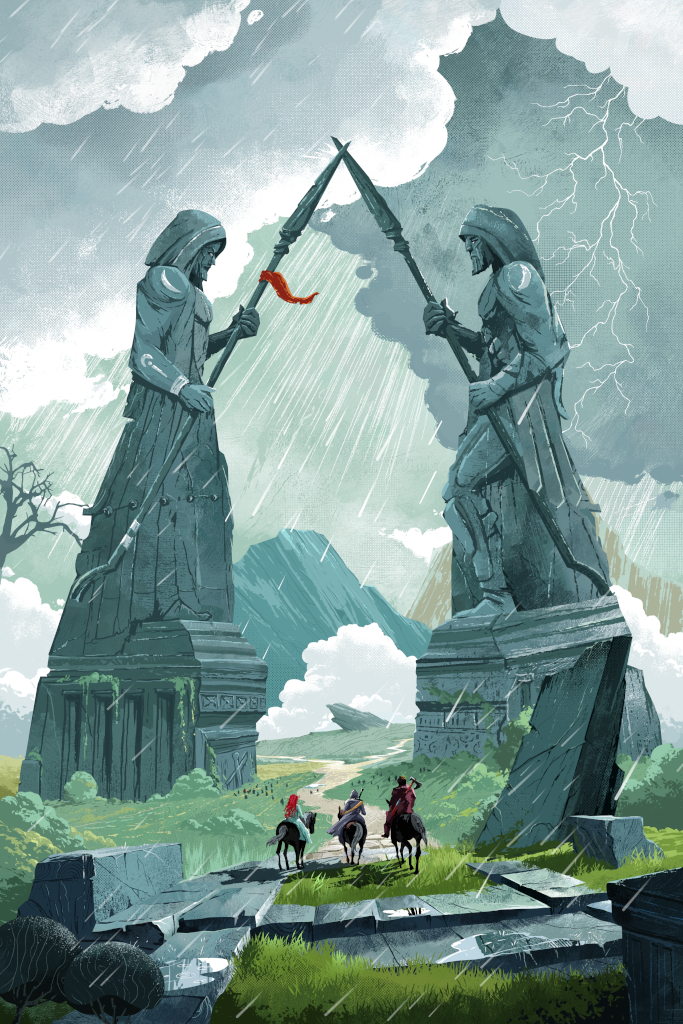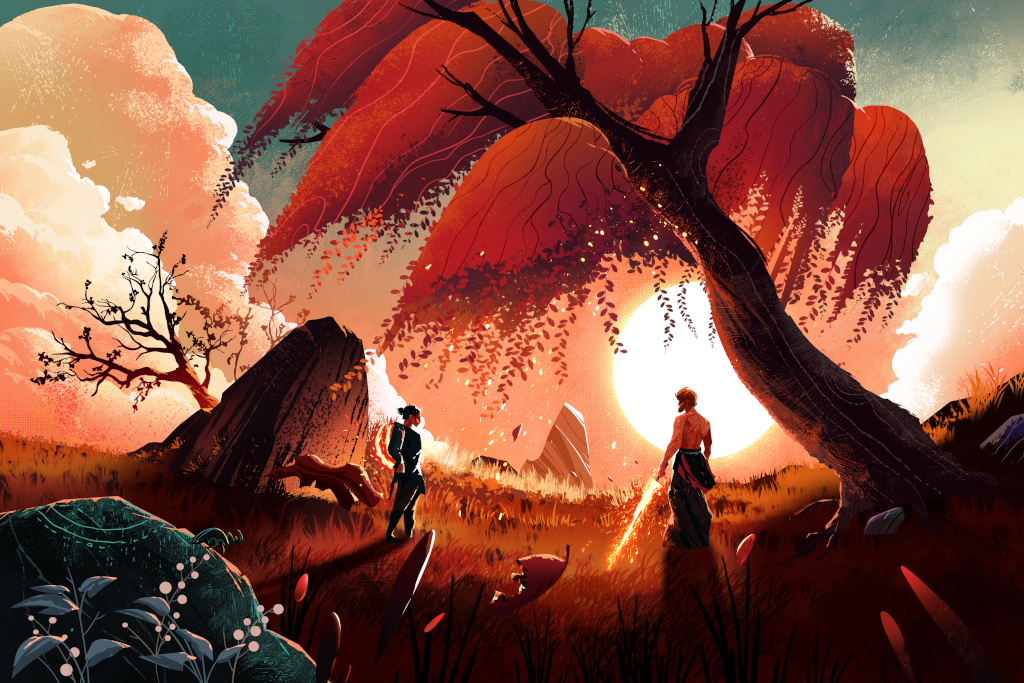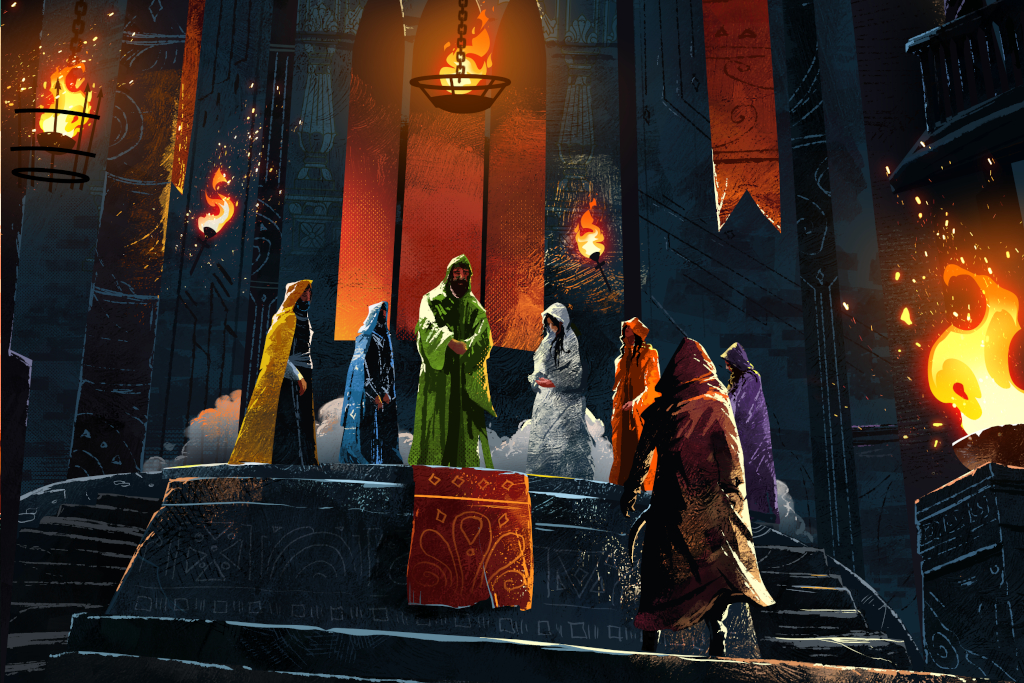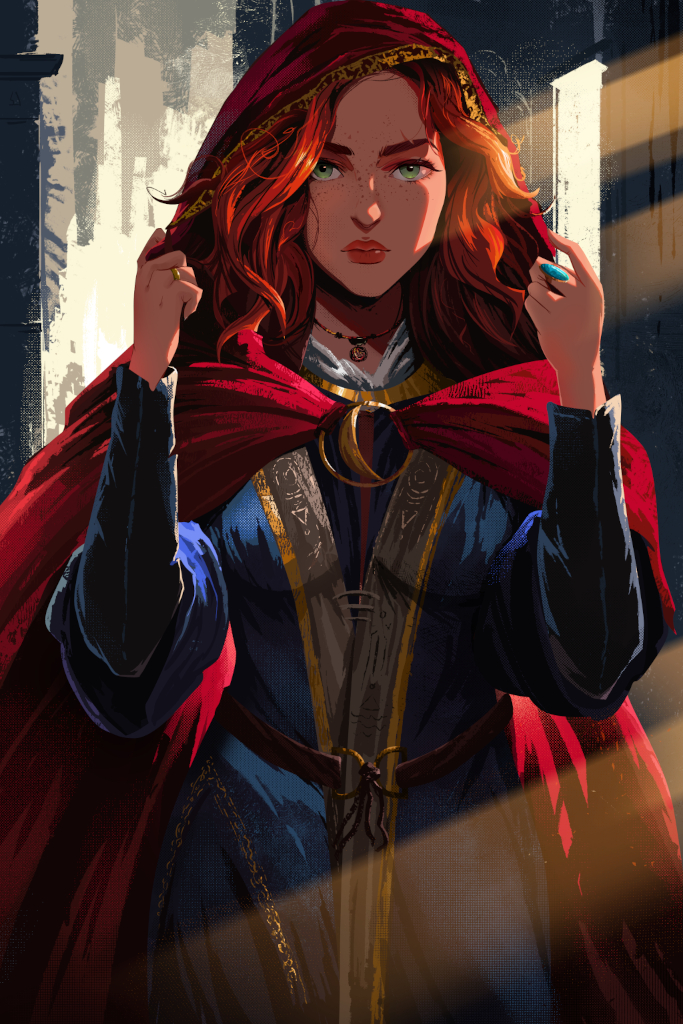In which a humble young carpet merchant wins, then loses, the princess of his dreams.
Far to the south of the land of Ingary, in the Sultanates of Rashpuht, there lived in the city of Zanzib a young and not very prosperous carpet dealer named Abdullah who loved to spend his time daydreaming. He was content with his life and his daydreams until, one day, a stranger sold him a magic carpet.
That very night, the carpet flew him to an enchanted garden. There, he met and fell in love with the beauteous princess Flower-in-the-Night, only to have her snatched away, right under his very nose, by a wicked djinn. With only his magic carpet and his wits to help him, Abdullah sets off to rescue his princess....
Fourteen-year-old Mona isn’t like the wizards charged with defending the city. She can’t control lightning or speak to water. Her familiar is a sourdough starter and her magic only works on bread. She has a comfortable life in her aunt’s bakery making gingerbread men dance.
But Mona’s life is turned upside down when she finds a dead body on the bakery floor. An assassin is stalking the streets of Mona’s city, preying on magic folk, and it appears that Mona is his next target. And in an embattled city suddenly bereft of wizards, the assassin may be the least of Mona’s worries…
A groundbreaking work of science fiction, The Left Hand of Darkness tells the story of a lone human emissary to Winter, an alien world whose inhabitants spend most of their time without a gender. His goal is to facilitate Winter's inclusion in a growing intergalactic civilization. But to do so he must bridge the gulf between his own views and those of the completely dissimilar culture that he encounters.
Embracing the aspects of psychology, society, and human emotion on an alien world, The Left Hand of Darkness stands as a landmark achievement in the annals of intellectual science fiction.
At first, only a few things are known about the celestial object that astronomers dub Rama. It is huge, weighing more than ten trillion tons. And it is hurtling through the solar system at an inconceivable speed. Then a space probe confirms the unthinkable: Rama is no natural object. It is, incredibly, an interstellar spacecraft. Space explorers and planet-bound scientists alike prepare for mankind's first encounter with alien intelligence. It will kindle their wildest dreams... and fan their darkest fears. For no one knows who the Ramans are or why they have come. And now the moment of rendezvous awaits — just behind a Raman airlock door.
A standalone high fantasy novel from the most famous and prolific fantasy authors in Georgia.
Wards of the Moon follows characters from diverse backgrounds and times, who have all undergone a mysterious rite in a desert city overseen by an old hermit, who might be hiding his own agenda.
The borders between time, space and worlds blur as the race gets more desperate and those not ruthless enough are sacrificed to achieve a nebulous goal.
About the author:
Nato Davitashvili has faced various obstacles as a pioneer female fantasy author in Georgia. Her first novel “Tale of Lile Iroeli” was published under a male pseudonym, advised to avoid expected ridicule and prejudice from readers. The novel was reprinted under her own name and was followed by many others, since becoming a household name as the author that gave Georgian mythology a new life in her novels.
Author has mainly drawn inspiration from Georgian myths and legends, however later in her career she has expanded to other sources. Her later novels have flavors of the middle-east, more specifically - Persian folklore and the 1001 nights. While not of Georgian origin, those tales and myths have had a huge influence on Georgian culture throughout the centuries and excerpts from Shahnameh have been told as fairy tales to young kids.
While the tone in her books has always been hopeful and somewhat heroic, in Wards of the Moon the author is not afraid to confront the darker side of humanity and lay out a story with no clear heroes. What can a good person achieve, when the world itself might be a creation of careless, bored gods?
In Return: Humans & Others and Bestiary of Orsi Nato Davitashvili has stepped away from fantasy a bit to explore science fiction. However in these stories her trademark magical spark is still present.
“The Woman in the Mirror” by Aleksandre Abasheli was first published in 1930 and is the first Georgian sci-fi novel. The story follows Gurgen Kamareli, a scientist and an inventor living in Tbilisi in the first half of the 20th century. His life gets turned on its head the minute a peculiar stranger walks through his office door, with equally peculiar offer. The collaboration between these two scientists not only yields astounding inventions, but influences the future of the whole planet.
The sci-fi elements of the story, such as the invention of a new type of energy and interplanetary travel are tightly wound to the geopolitical context of the era. However, beyond the technological predictions and political intrigue — there is romance, which gives additional emotional depth to the story.
George Orr has a remarkable power — he can change any aspect of reality by dreaming. The problem is — he has no control over it. When Orr encounters a person who would wield this power for selfish or philanthropic reasons, the world will face a whole new kind of danger.
The characters of the book try to find their place and the meaning of life in an ever-changing reality. On this backdrop, the ethical dilemma the book tries to address is this: if one possesses unlimited and uncontrollable power, is acting upon it more of a crime or inaction?
"The Lathe of Heaven" won the Locus Award in 1971 and describes a future that is not so different from our present. A world ravaged by unending wars and pollution, where pandemics are part of life, and where the 'happy end' is starting to look more and more like a compromise.
The chaos first stirred when, in blackness filled with crimson light, the sound of breaking bones reached Ake's ears and his nostrils were assailed by the scent of burnt flesh.
The chaos quickened, got stronger, reared up like a wave, and threatened to wash away everyone and everything. It started to seep out without leave and manifest in ways that seemed terrible even to the wielder of this power.
Everyone knows how the story of Ikarus ends: blinded by curiosity and ambition, he decided to touch the sun and perished in terrible agony... But what if, instead of agony, there was a smile on his face? What if this grandiose departure is what he had in mind?
Haunted by a tragic past, Ake likewise tries to touch the sun and turn this rotten world full of magic, archaic beings called Kabalas and their chosen Kabalers, kingdoms blinded by false beliefs and hatred for one another, breathtaking cities with age-old secrets buried under them, upside down with no less rotten methods.
Let the Maker's will be done, and nameless Ake find answers to his ambitions!
Let fire take it all!
Check out this book in our rights catalogue 📕
Illustrations by Giorgi Magradze Artman
Note: these illustrations are not a part of the printed edition
In the kingdom of Ingary, where seven-league boots and invisibility cloaks aren't news to anyone, it is considered a great misfortune to be born the eldest of three. Everybody knows that if all three go seeking their fortunes, the eldest will be the one to taste the most bitter failure.
Sophie reconciled with this fate from the start and decided to spend her life working in her father's hat factory in peace. However, everything changed when, one fateful day, she incurred the wrath of the Witch of the Waste and was turned into an old woman. The key to breaking the curse rests in wizard Howl's Moving Castle.
In this book, you'll meet witches, wizards, castles, talking things, enchanted beings, stepmothers, princesses, very long stairs, falling stars, and... lots and lots of goo.
This is a magical yet dangerous world with endless possibilities. You'll be on the edge of your seat till the last page, because, as Calcifer once wisely remarked, "Nobody’s safe in a wizard’s house."
You probably know "Howl's Moving Castle" from Studio Ghibli's Oscar-nominated movie of the same name; however, prior to Hayao Miyazaki discovering it, Sophie's and Howl's adventures delighted readers for two whole decades.
Dr. Spaak is a surgeon of extraordinary skill. He can change a man's appearance to such a degree that even his mother will not be able to recognize him. The book follows several characters as they try to unravel the ominous events surrounding the doctor. The truth hides behind "Spaak & Stix", a company that painlessly and instantaneously sends its clients to the next world after filling out the corresponding form and paying a small fee, of course. The novella was first serialized in abridged form in the journal "Nakaduli" in 1991.
Check out this book in our rights catalogue 📕
"Connection of Ages" is an anthology of Georgian sci-fi stories from the 20th century.
Here you'll find a story about an artificial brain, on whose calculations hangs the fate of the world; a history of selflessness on a dangerous cosmic mission; intergalactic pirates, whose deeds have left an indelible mark on mankind's history; a Georgian hero, that finds himself in an utopia; a story of time travel, that cautions us about the dangers of misusing scientific achievements; postapocaliptic reality that shows us the destructive power of atomic weapons; and a Georgian medic, that finds himself returning from a cosmic mission to the earth reeling from a recent pandemic.
These science fiction stories describe stories of various travels — be it in time, the cosmos, or our inner worlds. Reading them is a kind of time travel in itself, into the 60s and 70s Georgia of the past century. These unique cultural artifacts show us what was worrying, or what was prudent to worry about, for writers under the Soviet regime. This uncanny synthesis of heartfelt emotions and party directives makes this anthology a must-read for anyone who is interested in the recent history of Georgia.
Check out this book in our rights catalogue 📕














